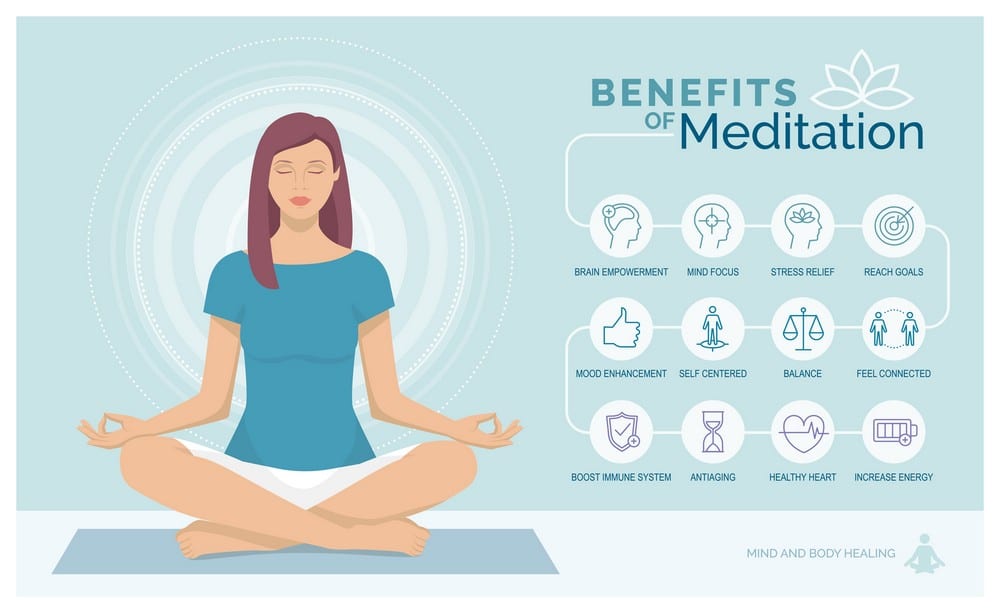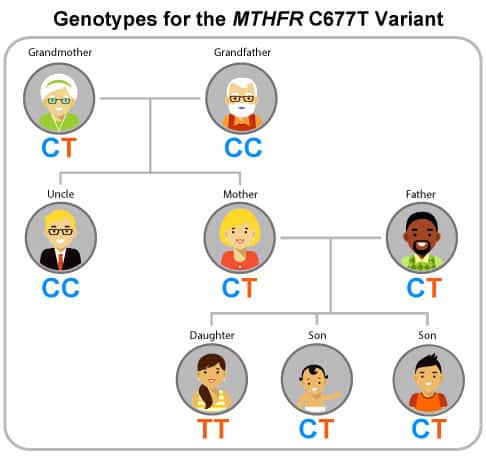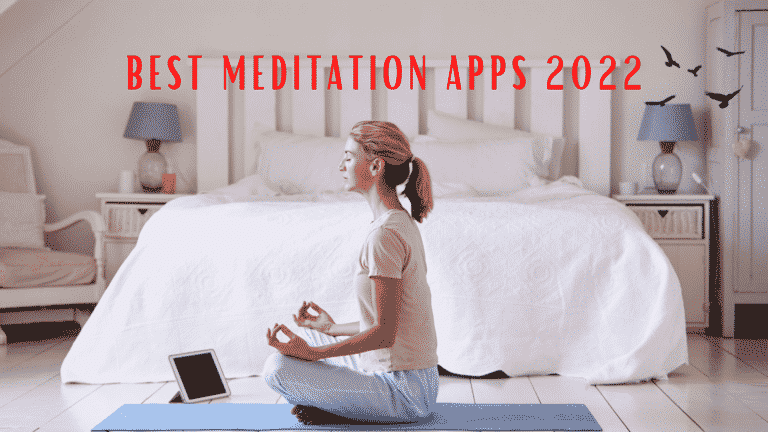How to Start Meditation For Improved Mental Health
Published on February 13, 2020 – Last Updated on March 13, 2024
Ah, meditation. Everyone keeps telling you the one word that answers your problems—meditation for improved mental health.
Feeling anxious? Try meditation.
Trouble sleeping? Try meditation.
Back pain? Try meditation.
Just got rejected? Try meditation!
If you’re reading this, you’ve probably heard some variation of the above. And you’re either thinking one of two things:
“But does meditation work?”
OR
“Ok, ok. I believe you. But I don’t know where to begin ….”

If you’re in the first category, know that YES…meditation can help many aspects of your health, from anxiety and depression to rejection and overall improved health.
Meditation stimulates the parasympathetic system of your body. This system is commonly referred to as the “rest and digest” system.
It is aptly named as it promotes relaxation in your body (allowing your body to focus on tasks such as digestion) through deep breathing and focusing your mind on the present moment.
If you’re in the second category…well, you’re not the only one! So many people hear the benefits of meditating and often seek it out for mental health purposes but don’t know where to begin.
It cannot be very safe, and it is best to use wander prevention. And it can feel like you’re doing it wrong if your mind is constantly drifting to random thoughts.
Find out more about morning meditation here.
The truth is that meditation is for everyone.
Even for beginners like you. Even for those of you who have trouble keeping your mind clear of thoughts. Check out our article about the best meditation app, which analyzes the best meditation apps on the market so you can start your practice in no time.

This article shares how to start meditation for improved mental health if you’re a beginner or feel intimidated.
Because honestly, meditation has so many benefits that everyone should experience firsthand.
Alright, let’s get to it!
1: There is no RIGHT way to meditate. Repeat after us: there is no right way to meditate.
Yes, as simple as it sounds, the first step to start meditating if you’re a beginner is to realize that there’s no right way to meditate.
It can seem like you need pro material or a studio pass.
But you don’t. It would help if you had a fancy studio. Or special cushions. Or to be in a particular posture or form.
You just need YOU and somewhere comfortable to sit.
This will be especially helpful when you’re starting out, as you’ll be able to focus on the simple act of meditation and not worry about being perfect.

When you start meditating, sit in a comfortable posture that allows you to be alert yet still relax and do some deep belly breathing.
You can meditate on your couch, on the floor, on a cushion, and even lie down.
The vital part of meditation is engaging your mind in present mindfulness.
This brings us to…
2: It’s ok if your thoughts wander during meditation. Bring your focus back.
Yep, you read that right. Meditation isn’t about keeping your mind a blank canvas.
While meditation does urge you to keep your mind “blank,” it’s normal to have your thoughts wander.
Even people who meditate regularly struggle with this from time to time.
Think of it like this: meditation is more about practicing being present. While keeping your mind blank is essential, recognizing when your mind has drifted and bringing your focus back gently to the present moment is part of being present.
So if you have a thought like: “Wait, is it my turn to do the dishwasher today?”
Accept it, breath into it (using deep belly breaths), and let go of it as you exhale.
Being gentle to yourself and accepting these thoughts as they pop up is crucial in practicing mindful meditation as being present. Acceptance of these thoughts helps you to be aware.
3: Try guided meditations for mental health now!

Once you’ve gotten into a healthy mindset using the tips above, it’s time to put it into practice.
Now you may be facing another roadblock: how do I physically start practicing meditation? And what type or kind of meditation should I be doing?
You may be feeling overwhelmed by all sorts of meditation types you’ve heard.
So if you’re a beginner: keep it simple. Mental health meditations will help you achieve whatever goal you decide.
Start with guided meditations. You usually don’t know what to do with your body or mind when you’re starting. And it would help if you had someone to guide you.
Guided meditations involve a narrator guiding you through the process of getting into a comfortable position to getting into a mindful state.
And they usually remind you to bring your thoughts gently back to the present moment, just like we discussed in the previous point.
Guided meditations are available through the internet and apps like ours.
Our meditation app offers helpful guided meditations that will gently tell you what to do so that you’re no longer confused about what to do during meditation. It can be an excellent place to start and is free to download.
Once you’re comfortable with the process of meditating, you can move on to silent meditations.
Silent meditations are, as the name suggests, silent. Are they good meditations for mental health?
They usually rely on the meditator (i.e., you) to get into a position and mindset for meditation on their own.
If you’re starting and you know no idea what to do with your body or mind, this can be daunting.
This is why having guiding meditations can be helpful!
But if you’re comfortable enough, you can, of course, try silent meditations. Our app also has silent or unguided meditations to help you get started.
4: Pencil in a specific time and day for your meditation
Ok, you’ve got the mindset, you’ve got the app or resource for guided meditations, and now you need to put it all into action.
Sometimes, even though you fully intend on doing something and you forget.
We’re human, after all. Unfortunately, our memory, although strong, isn’t 100% reliable.
The best way to make sure you get in that meditation session is to schedule it into your calendar.
Making it a concrete, real tangible thing by scheduling it will make you less likely to forget.
Plus, even if you do, your calendar will remind you.
Hold on, though. Before you start penciling it in, think about the best time to meditate on your schedule.
Incorporating a new habit can be tricky sometimes. So don’t try to force yourself into waking up at 4 am to meditate if that’s not your usual waking time.
Look at your schedule and pick a convenient time and place. Then, make it work for you.
Even if you only have 5-10 minutes for meditation. Starting with a small duration like 5 minutes can be enough to reap the benefits of meditation. And it’s less daunting too, as a beginner!
Ready to start meditation for improved mental health, better sleep, and experience overall wellbeing? Download our meditation app for free!





One Comment
Comments are closed.